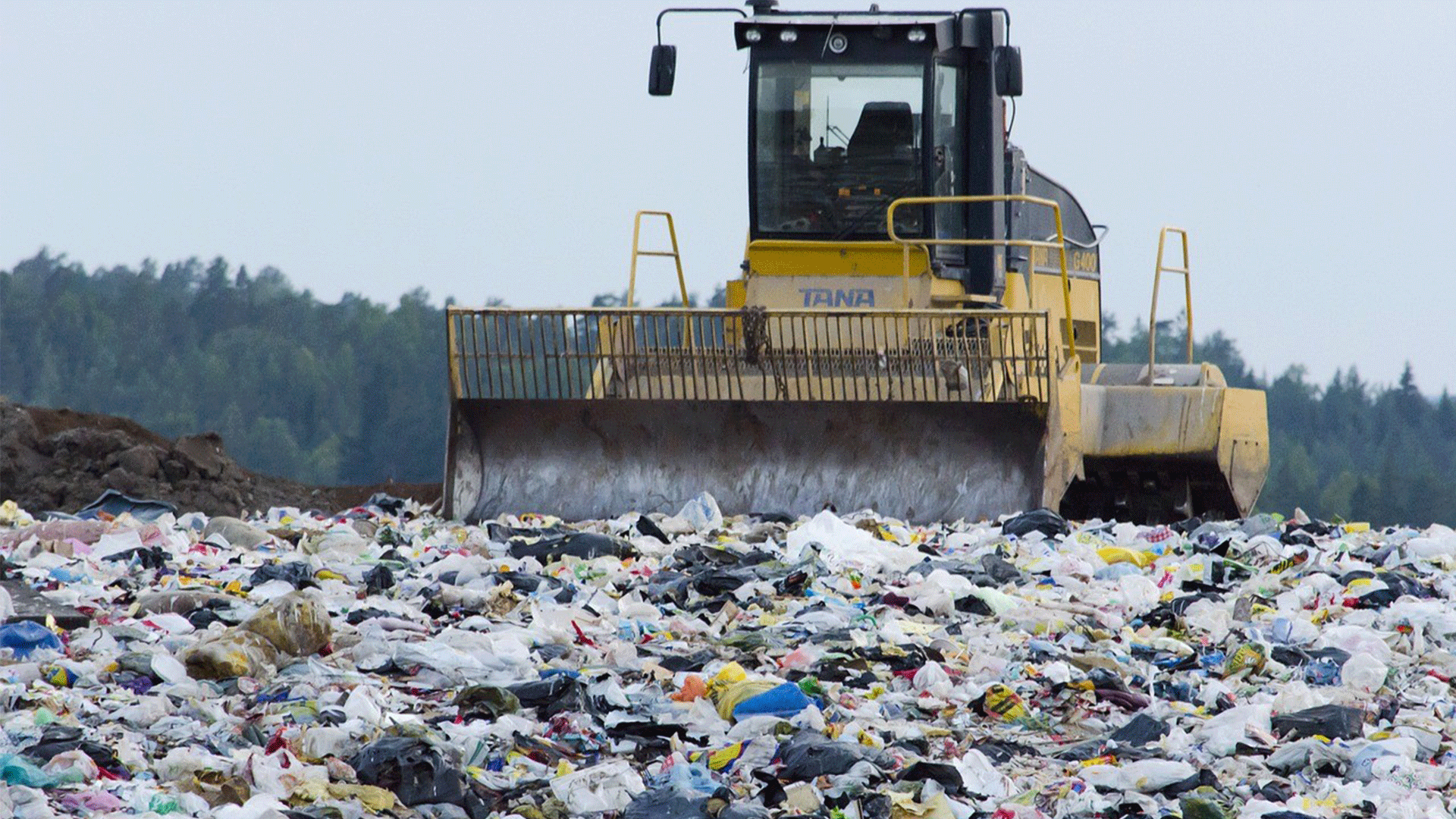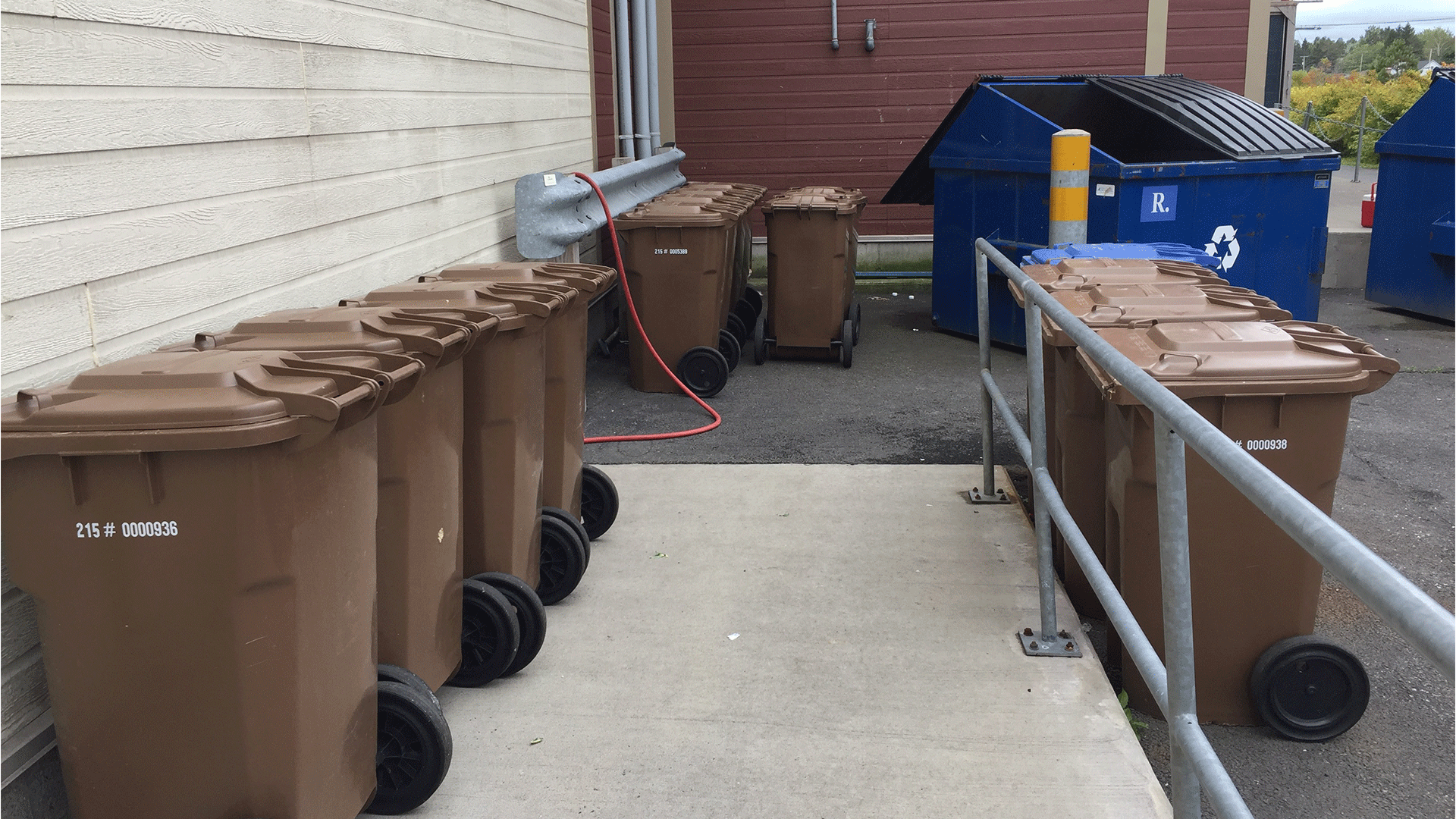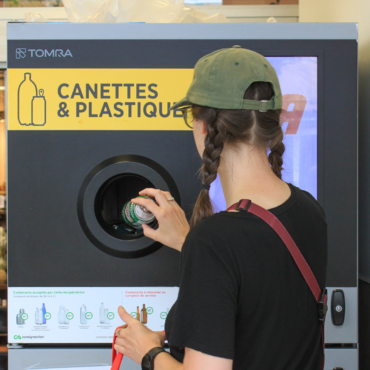Blog & News
Tips and tricks

We’re slowly but surely starting to grasp importance of composting food waste at home. But what about the waste of the so-called ICI sector (institutional, commercial, and industrial)? Indeed, households are not the only generators of compostable materials. Restaurants, grocery stores, and schools are also important players in diverting compostable materials from landfill. So let’s take a look into the world of Earth Day Canada’s Waste Management Advisors to understand how compost bins work in a business.
Before we start… remember why we compost!
I’m sure you know that composting is good, but do you remember why? Compostable matter is primarily organic and is therefore living matter. Basically, when this material (your peelings, your chicken bones, your rotten old yogurt — oops!) ends up in your garbage bag and then in a landfill, it is deprived of the oxygen it needs to decompose in a healthy manner … and it’s not happy about that! That’s when it generates greenhouse gases (GHGs), including nasty METHANE, a GHG like carbon dioxide but 25 times more harmful! Booo. Moreover, by dumping organic matter in landfills, we are depriving ourselves of a great fertilizer which would help reduce GHGs by sequestering carbon in the soil.
So, isn’t putting your leftovers in the compost bin rather than the trash wonderful? (Watch out, food waste is yet another matter!)

And how about the businesses?
It is admittedly more difficult for a business to participate in the collection of compostable materials. Unlike with our compost bins at home, businesses are not automatically provided with bins by the municipality, and it’s not free of charge. And that’s if the compost collection service is offered to businesses in the first place! In fact, in some cities, this service is only offered to residents; businesses must turn to private collectors, which often means higher costs. As if that wasn’t enough of a challenge, there are even cities where NO collection service is available. This is often because there is no composting plant or system nearby, which is so regrettable — our sympathies to our friends at the IGA in Amos, and so many others!
Nonetheless, I’d like to give a shoutout (I see you!) to a few cities that have INCREDIBLE compost collecting projects for their businesses. Some of them offer a free service
(Lévis) or one at very low cost (Drummondville). Sure, it’s true that businesses participate in the financing of this service through their own municipal taxes, but that’s not the point! What we like is the fact that there is a well-organized project for compost collection to encourage businesses to take part in this environmental act.
Beyond the costs, there are major logistical obstacles and employee training challenges for businesses. This is where the role of the Waste Management Advisor comes in.

What exactly does a Waste Management Advisor do?
As I’ve explained, it’s no simple task for a business to set up a compost collection program. Enter the Advisor, whose roles is to make it easier!
Fonds Eco IGA
At Earth Day Canada, we have the opportunity to work with 295 IGA stores across Quebec and New Brunswick, thanks to the Fonds Éco-IGA. This means that each store has a dedicated Advisor (not that that means there are 295 advisors!), to help them better manage their waste. In other words, they help stores divert as much material as possible from landfills (remember before when I explained what happens to compostable materials in landfills? No thanks!). To make this happen:
- They visit the store to understand its logistics, the space on the shelves, and the space available to set up compost collection — maybe you never thought about it, but in your home there’s just one kitchen to manage. In an IGA, there’s a lot more than that!
- Then, they research whether the service is offered by the municipality (and whether it’s free!), which private collectors operate in that area, and the services each one provides in order to evaluate whether they meet the needs of the IGA. Let me tell you, there’s more than a slight difference between the amount of potato peelings you produce at home versus the amount produced by an IGA. #MyShepardsPieIsBiggerThanYours.
- They also offer in-store training and personalized checklist tools to help employees demystify and better understand what they can put in the compost bin! A grocery clerk already has a hundred other things to manage, so we want to make composting as easy as possible! We also want them to understand why it’s important to do it. Part of an Advisor’s job is to help raise awareness among employees.
Psssst ! If the team of Advisors could tell you one thing, it would be that interacting with the staff is what they enjoy the most!
I often hear people complain: “We’re always expected to do our part, while industry does nothing!” I understand this frustration (and I share it), but I hope today I’ve managed to explain to you that it’s not always as simple as it sounds, and that Earth Day Canada’s waste management team is quite proud of what it’s been able to accomplish thanks to the involvement of the IGA staff. Also, here I’ve only told you about compostable materials, but the team is hard at work on the collection of other materials too (we’ve got a lot to do, don’t worry!).
If you’d like to know how your IGA is taking steps to improve waste management, take a look at this map. Use the search bar on the map to find out if your store is Action Réduction certified. This is an Earth Day Canada certification for waste management, which you can find here.

Coordinator — Waste Management
Karoline Bessette-Simard
Passionate about the environment, one goal motivates her: to find simple and creative solutions to protect our planet! She considers waste management as a primary field of action, since it concerns the daily life of everyone. Her favorite activity? Get lost in the woods with her tent and her friends!
View all posts...Related posts :
Contact us
Earth Day Canada
5818, boulevard Saint-Laurent
Montréal (Québec) H2T 1T3 Canada
Phone : (514) 728-0116
Toll free : 1 800 424-8758
Fax : (514) 303-0248
Email: hello@earthday.ca
2026 © Earth Day Canada. All rights reserved.
Privacy policy · Terms of use · Trademark









